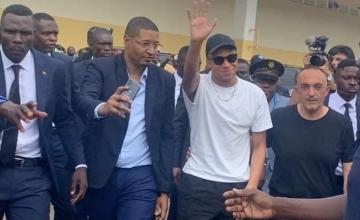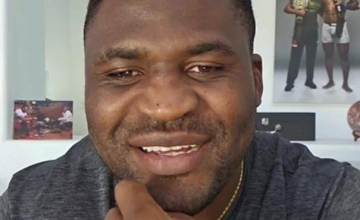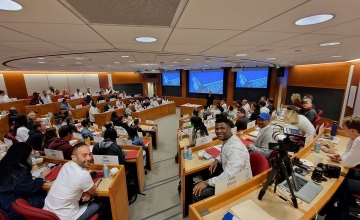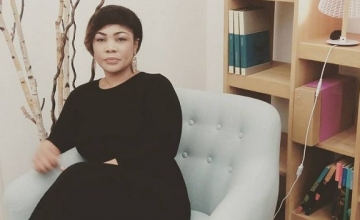
The Founder/President of the Centre for Human Rights and Democracy in Africa, CHRDA, was reacting to information spelling out the commissions that will animate the September 30 to October 4, 2019 peace talks at the Yaoundé Conference Center.
The eight sub-commissions will cover the following topics: Bilingualism, Cultural Diversity and Social Cohesion Commission; Educational System; Judicial System; Decentralisation and Local Development; Reconstruction and Development of Crisis-Affected Regions; Return of Refugees and Internally Displaced Persons; Disarmament, Demobilisation and Reintegration of Ex-combatants; and Role of Diaspora in the Crisis and its Contribution to the Country’s Development.
The Vice President of the African Bar Association, AfBA, in charge of Central Africa raises fundamental concerns about the thematic areas of the commissions, wondering why the form of the state, amnesty and reconciliation were conspicuously left out. He goes not to pick holes in the fragmentation of the issues.
The thematic dispersal which does not allow deliberation on whether the State’s structure is optimal to deliver in these domains, as pertains to the Northwest and Southwest regions worries the human rights lawyer who also lectures law at the University of Buea.
He writes: “Taken individually, several of these sub-commissions’ themes address issues of import to, and that explain the genesis of the Anglophone crisis. However, the proposed structuring of the sub-commissions carries with it the risk of fragmented and dispersed discussion of issues that are profoundly inter-connected.
“Can a profound discussion on the viability and integrity of the sub-system of education in English in Cameroon take place without connecting it to the question of what role the Northwest and Southwest regions (in the context of devolution of functions to those regions) have in the sustenance of that system? (Commissions 3 and 6 are intricately linked). Can a discussion on the use of Cameroon’s official languages in its respective regions (bilingualism) take place without determining whether its regions (especially the Northwest and Southwest) have a say on what the preponderance of use of the official languages should be in those regions? (Commissions 1 and 6 are intricately linked).
“Data on school enrolment and examination registration from the Ministries of Basic Education and Secondary Education show that, the NW and SW regions overwhelmingly subscribe to the English education sub-system (and vice-versa in the other 8 regions), while data from the last General Population and Housing Census (2005), shows that the preponderance of English to French use is 4:1 in the NW/SW, and French to English is 5:1 in the other 8 regions. Should the respective regions not therefore have a say as to what predominates in language use, and educational systems within their sphere? Cameroon’s regions, in its current decentralisation framework (1996 Constitutional revision, 2004 Framework Law on Decentralisation, Laws on Regions and Councils) have no powers as concerns the educational content/curriculum, or management of teaching staff (down to primary schools) in the education system, and no say as to the languages used by civil servants within their spheres. (This connects sub-Commissions 1, 3, and 6).
“The fundamental point is that the thematic organisation of the Dialogue risks hiding the forest behind the trees (l’arbre qui cache la forêt). There needs to be an opportunity to discuss what structural changes are necessary to ensure that the provision of State services, and the exercise of State authority in those regions, is done on a model that empowers the regions’ inhabitants and resonates with their linguistic and related peculiarities. This can be achieved by expunging the phrase ‘local development’ from the remit of sub-commission 6 (which repeats ‘development’ in sub-commission 5’s remit) and empowering that sub-commission to examine more broadly, the ‘Ordering of State functions and services’ in the NW/SW regions.”
Agbor Balla also expounds on his dissatisfaction with the absence of a sub-commission on Amnesty, and a National Reconciliation Programme.
His words: “The National Dialogue is not an ordinary sectoral conference, colloquium, or workshop as Yaoundé hosts regularly. It is destined to be, based on the Presidential mandate assigned to it, a moment for national introspection, reflection, and proposals, to enable the country to emerge from its first major, domestic or internal armed insurrection in over 50 years. “The crisis has seen the loss of life, limb, liberty, property, and hope for so many compatriots. It is evident that to proceed on the path of peace, and to get armed actors to lay down their arms, a mechanism for amnesty will need to be envisaged, in order to enable those concerned to return to the national fold, and work towards reconstruction of a better Nation for tomorrow.
“Likewise, the Northwest and Southwest regions, and with them, the broader Nation, need a healing process, to help cure the trauma caused by the killings, maiming, torture, arsons, kidnapping, and sexual violence that have characterised this period of national grief. It is therefore perennial that a process of national reconciliation and healing be considered an integral part of the Dialogue’s remit and be formally assigned to a sub-commission. The sub-commission presently assigned DDR could be expanded to incorporate the above two functions, while ensuring that all three mandates (amnesty, national reconciliation, and DDR) are given equal treatment in its work.”














